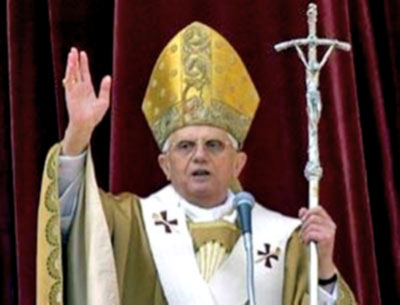|

by Theodora Filis
June 21, 2011
from
UKProgressive Website
|
Theodora Filis
is an environmental journalist, consultant and college
instructor. She is a regular contributor to UK
Progressive.co.uk, Examiner.com, and a Moderator for
sub-group CLIMATE on LinkedIn.
Theodora's articles
have appeared in newspapers and magazines worldwide,
including The San Francisco Chronicle, KOBE News, World
Farming, United Nations Association, UK and World Tech
News.
You can view her
blog at
http://www.dfilis.blogspot.com
|
Since the turn of the century, the Pontifical Academy of Sciences,
the scientific academy of the Vatican, whose 80 members are
appointed by the Pope, has kept the world guessing:
Will the Catholic Church fully
support
genetically modified organisms?
Then, on November 30 last year, 40
international scientists, including seven Pontifical Academy
scientists, released a statement demanding a relaxation of what they
call "excessive, unscientific regulations" for approving GM crops,
saying that these measures prevent development of crops for the
"public good".
The academy scientists also claimed that
scientists have both the right and a moral duty to be "stewards of
God" by genetically modifying crops to help the world’s poor.
I’ve heard that before - from
Ingo Potrykus.
Potrykus is a member of the Pontifical
Academy, based at the Swiss Federal Institute of Technology
in Zurich, where he developed ‘golden rice’, and was instrumental in
bringing about the 2010 meeting.
Interestingly, but not surprising, most of the 40 participants at
the meeting were long-time supporters of GMOs.
According to the magazine U.S.
Catholic, not only did the participants include GMO developers
(both, those who work for governments and for companies that sell
genetically modified seeds), but at least four of the speakers at
the meeting have ties to
Monsanto.
The US, home to the multinational biotechnology giant Monsanto, has
lobbied the Vatican for years to persuade it to speak positively
about GMOs, calling biotechnology a "moral imperative" to
feed the world’s hungry.
Both the pope and the chancellor of the academy, Bishop Marcelo
Sanchez Sorondo, one of the seven Vatican advisers at the
meeting, tried to distance themselves from the endorsement, saying:
"These statements cannot be
considered the ‘official’ position of either the Holy See or the
Academy."
Despite attempts by the Vatican to
remain publicly neutral,
WikiLeaks recently uncovered a transmission
from Christopher Sandrolini, a US diplomat to the Holy See,
that demonstrates the Vatican’s clandestine approval of GM crops.

If "official position" merely means that
Pope
Benedict has not endorsed GMOs
during a Sunday mass, then maybe his and Bishop Sorondo’s
arguments have some merit.
However, it is difficult for the Holy
See, and those that influence the pope, to claim neutrality without
appearing disingenuous given the recent WikiLeaks transmissions.
Washington’s greatest ally at the Vatican has been Italian Cardinal
Renato Martino, who spoke of the benefits and safety of GMOs,
and who hosted a biotech conference at the Vatican in 2003, while
living in New York as
the Vatican’s ambassador to
the United Nations.
However, WikiLeaks cables indicate
Martino may have been playing the role of a good diplomat.
"A Martino deputy told us recently
that the cardinal had cooperated with (the embassy) on biotech
over the past two years in part to compensate for his vocal
disapproval of the Iraq war and its aftermath - to keep
relations with the US (government) smooth," reported one cable.
"According to our source, Martino no
longer feels the need to take this approach," the cable said.
The Vatican has said the
Wikileaks cables
reflect only the views of the people who wrote them - again
they are not ‘official’ Vatican positions.
It is fair to say that the Vatican is actually quite modern in some
regards, being among rather few Christian ruling bodies that don’t
perceive themselves as being directly threatened by real science.
The Vatican does, after all, accept the evidence of evolution,
astronomy, archaeology and biology - and there are many churches
that can’t say the same.
But it is because of this relative modernity that the policies of
the Vatican on GMOs need to be taken seriously.
Should the church’s tendency to support
GMOs become the ‘official’ position, this will have ripple effects
that are likely to reach everyone.
|

